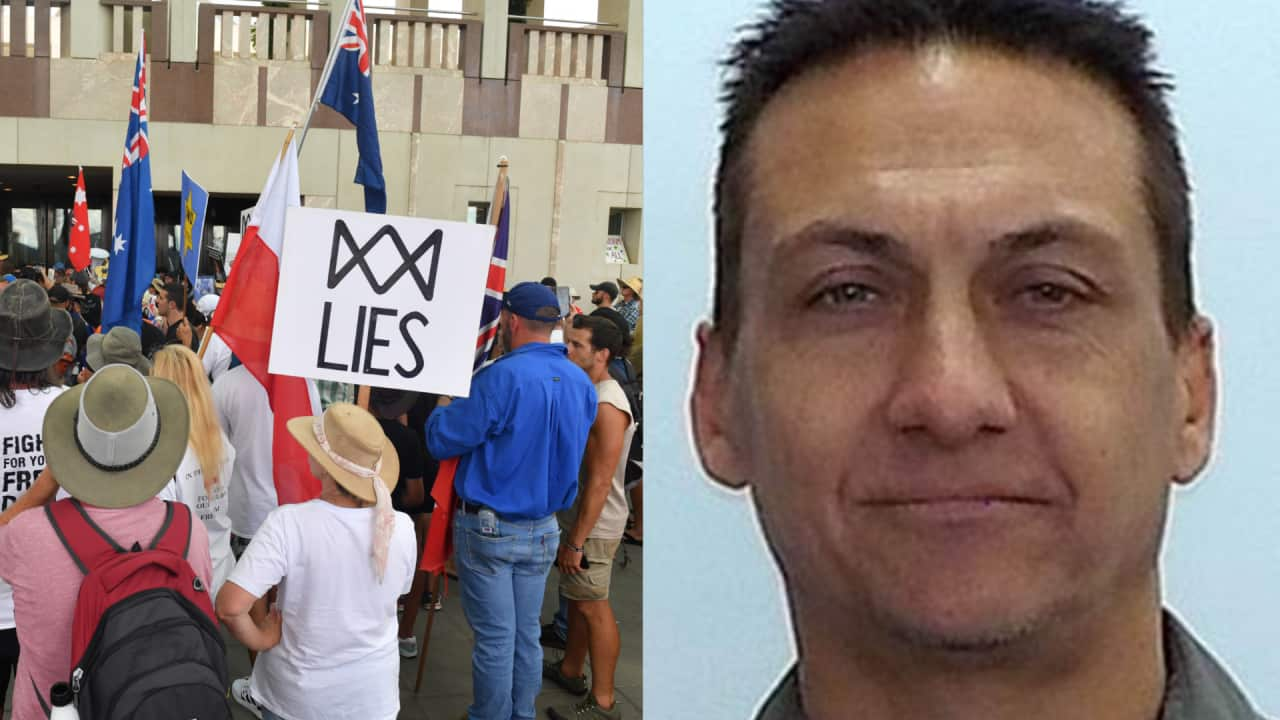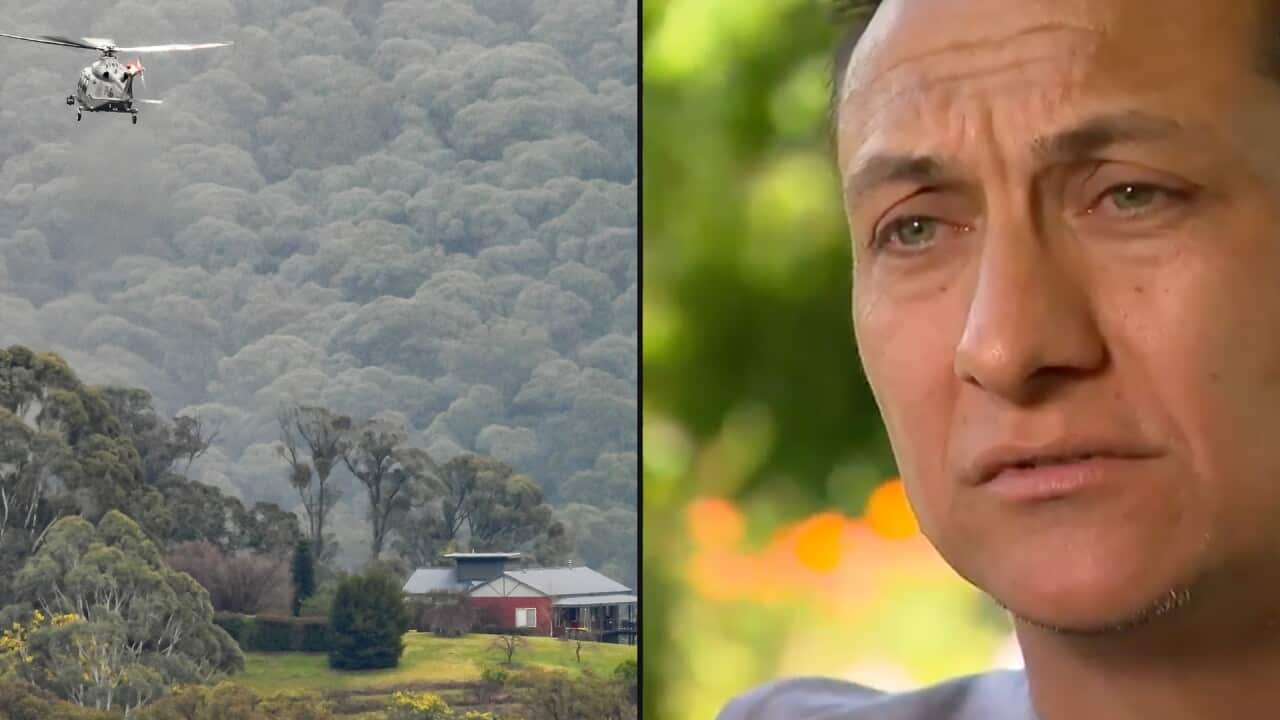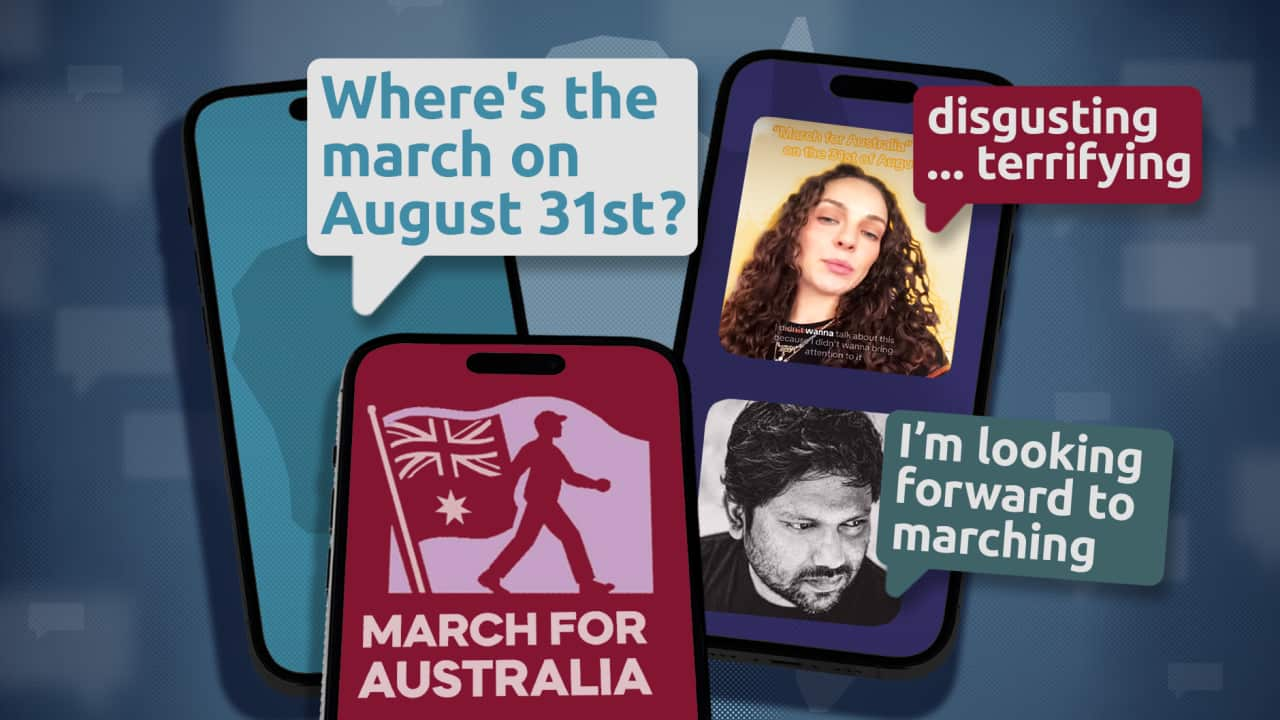The man wanted by Victoria police for allegedly murdering two police officers is a "very active" member of the sovereign citizen movement — an "isolationist" who believed "police were demons", extremism experts say.
Dezi Freeman, born Desmond Filby, remains on the run a day after allegedly shooting dead two police officers and injuring another, as the officers were executing a search warrant in the rural Victorian town of Porepunkah.
The 56-year-old has had a long history of issues with authority, calling police "terrorist thugs" according to court documents and trying to arrest a magistrate, and is considered by experts to be a "very active sovereign citizen".
"He's been held in high regard by the sovereign citizen movement," Dr Kaz Ross, an independent researcher into conspiracies and right-wing politics in Australia, told SBS News.
Ross says Freeman is just one example of Australia's broader sovereign citizen movement — and warns of its dangers.
What are sovereign citizens?
Sovereign citizens see themselves as outside of the legal system.
"To be a citizen means that you are part of Australia and the Australian legal system. But they see themselves outside of that, so they see themselves as sovereigns," Ross told SBS News.
But they're not completely lawless. "They believe in the law and they believe in justice — they just think that our current system is wrong," she said.
The label 'sovereign citizen' is mostly imposed by outsiders. Many also call them "pseudo-law adherents" as they rely on fringe and baseless legal arguments to challenge authority.
That often plays out in clashes with bureaucracy: refusing to pay tax, fighting traffic fines, or representing themselves in court. Some embroil themselves in lengthy legal battles, losing cars, property, or even being jailed when their pseudo-law arguments inevitably fail.
They're also the same group of people who declared former Victorian premier Dan Andrews guilty of treason during the COVID-19 pandemic.
What does the sovereign citizen movement look like?
The sovereign citizen movement doesn't have a single leader or organisation, but is rather a patchwork of groups and individuals.
Some operate alone, while others form highly organised groups with rituals and hierarchies.
"They've designated sheriffs, they've designated magistrates, they have court hearings," Ross said.
"They take it very seriously. They have sheriffs who go around in little sheriff's uniforms. Some have badges on them."
A well-known example is Teresa van Lieshout, a far-right conspiracy theorist and sovereign citizen from South Australia who was charged in 2021 over allegedly importing hundreds of fake police badges as part of a plan to overthrow the government.
Ross says that, when sovereign citizens cluster together, "they're very orderly and organised with a hierarchy".
Less organised and individual adherents often live-off grid, spend most of their time alone, and only come to authorities' attention when they clash with the law.
Organised groups tend to be concentrated in Queensland and Western Australia, while the less organised and "more chaotic" individuals are typically located in Victoria and Tasmania, Ross says.
Where did the movement come from?
Sovereign citizens are one part of what's often called the "freedom movement" — a loose network of people who resist government restrictions and call for greater autonomy and individual freedoms.
They became highly visible during the COVID-19 pandemic, rallying against lockdowns, mask mandates and vaccine requirements. But the roots of the ideology predate this.
Many are associated with men's rights movements, fringe Christian groups, or far-right activism.
But Ross says the pandemic accelerated their growth by offering a "package" of conspiracy theories that helped adherents make sense of chaotic events.
"We've got a situation where people are trying to make meaning of a pretty mind-shattering kind of event and suddenly all these conspiracies make sense," she said.
"Along with that comes this package of pseudo-law. Suddenly, they say they're not powerless and can do something about it.
"The group seems to have become quieter online, with fewer new people joining," she said. "The old hands are still hanging in there … but it's kind of dissipated to some extent."
While the movement is quieter than during the pandemic, Ross says its core ideas — that the government is illegitimate, police are not to be obeyed, and self-defence is always justified — continue to spread.
Why can they be dangerous?
Most sovereign citizens claim to be non-violent and see themselves as morally and legally correct.
"They believe they've woken up to the truth," Ross said. "In some ways, they have good intentions."
But pseudo-law beliefs can quickly escalate into real-world violence.
"There's a huge risk if you've got groups of people running around calling themselves sheriffs, serving arrest warrants on random people and taking the law into their own hands," Ross said.
That danger intensifies when sovereign citizen beliefs overlap with other movements, including anti-vaccination networks, conspiracy theorists, men’s rights groups and the far right.
Ross warns that they're often co-opted by more extreme groups.
She points to the upcoming 'March for Australia' rallies, which have attracted support from neo-Nazi groups, including Thomas Sewell’s National Socialist Network.
"The [March For Australia] organisers do not understand that they've been manipulated against Nazi-adjacent forces," Ross said. "They might be replicating white nationalist talking points without even understanding that they’ve ended up there.
"The anti-immigration push is coming from the very far right, including neo-Nazis. They’re trying to utilise the remnant power of the freedom movement. Of course, sovereign citizens are part of that movement."
The case of Dezi Freeman
Ross wasn't surprised to learn of Freeman's alleged role in the Porepunkah shooting.
"He's a very active sovereign citizen over the last five years. He's been held in high regard by the sovereign citizen movement," she said.
"This is someone who seems to have been an isolationist for quite some time, with some fundamentalist Christian beliefs, anti-vaccine homeschooling and also believing that he was targeted by police and that police were demons and he had the right to self-defence."
In October last year, Freeman launched a Supreme Court case over three driving convictions in 2020: for speeding, using a phone while driving and refusing to give an oral fluid sample for testing.
He claimed "the absolute heart of his case" was that he was acting in self-defence or was under duress when he drove away from police, while holding up his phone to film them.
He also previously tried to arrest a Wangaratta magistrate and police members in court.
Associate professor Joe McIntyre, an extremist expert at the University of South Australia, said Freeman's history should have been a warning.
"The accused shooter has a really long history of pseudo-law litigation, he looks to be one of the original versions predating COVID, where most were radicalised," McIntyre told AAP.
"He should have been on a lot of lists. He needs to have been treated differently and that needs to be looked at going forward."
McIntyre drew a direct line to the 2022 Wieambilla shootings in Queensland, where police constables Matthew Arnold and Rachel McCrow were ambushed and shot dead by brothers Nathaniel and Gareth Train alongside his wife Stacey. The Trains, who also shot dead a neighbour, Alan Dare, were killed in a shootout with police.
The Trains were not formally labelled sovereign citizens, but McIntyre believes they fit the mould.
"Both of these are in the regions. These are people who see a distrust of society and want to remove themselves from it," he said.
"There was a missed opportunity that has been replicated (in Victoria), and these instances are unfortunately inevitable in this type of behaviour.
"Once the law is optional, then lawfulness itself becomes an option."
A growing concern
The federal government has flagged sovereign citizen radicalism as a major concern.
Speaking on ABC's 7.30 on Tuesday night, Prime Minister Anthony Albanese said: "This is something that has permeated other nations as well. We see it being multiplied in the United States."
"The fact that this ideology of not seeing themselves being subject to our laws and our society. And it is a real concern and ASIO have warned that this threat is very real and that we need to be very vigilant about it."
Opposition home affairs spokesperson Andrew Hastie told ABC Radio on Wednesday: "A lot of people went down the rabbit hole during COVID, and they never came back up."
Ross emphasises that while some adherents act alone, they are part of a much larger ecosystem.
"None of them are lone wolves. They might be the one that takes the action," she said.
"It’s like a mushroom in the forest. What you see above ground is only one part — underneath is a vast system of mycelium [the root-like structure of fungus]."
— With additional reporting from Australian Associated Press.






